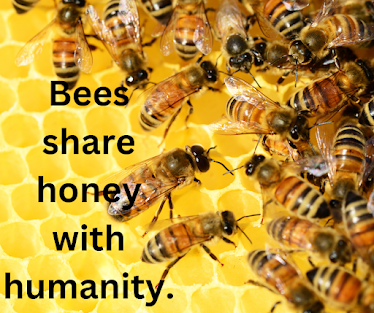The Humble Heroes: Unveiling the Profound Importance of Bees
In the vast tapestry of nature, there exists a small yet mighty creature that holds immeasurable significance for our planet. Bees, with their delicate wings and tireless buzzing, play a vital role in maintaining the delicate balance of our ecosystem. Their importance extends far beyond their ability to produce honey; they are the unsung heroes responsible for pollinating countless plant species, ensuring the survival of both our natural environment and global food production. In this descriptive essay, we embark on a journey to explore the profound importance of bees and the intricate web of life they weave.
The Pollination Process:
Nature's Harmony
When we observe a bee
gracefully hovering from flower to flower, it is engaged in a miraculous act of
pollination. As bees collect nectar to sustain their colonies, they
inadvertently transfer pollen from the male reproductive organs (stamens) of
one flower to the female reproductive organs (pistils) of another. This
seemingly ordinary process is the cornerstone of plant reproduction. Through
this harmonious partnership, bees facilitate the cross-pollination necessary
for the creation of fruits, seeds, and new plant life. Countless plant species,
including fruits, vegetables, and wildflowers, rely on this intricate dance
between bees and flowers to propagate and proliferate.
The Abundant Fruits of their
Labor
The significance of bees in
our food production cannot be overstated. It is estimated that approximately
75% of the world's leading food crops depend, at least in part, on pollinators
like bees. From apples, almonds, and berries to cocoa, coffee, and vanilla,
bees contribute to the cultivation of diverse crops that nourish and delight
us. Their tireless work ensures the continuation of agricultural systems and
secures the global food supply chain. Without bees, our plates would be
deprived of the rich variety of fruits, vegetables, and nuts that grace our
tables.
Preserving Biodiversity and
Ecosystem Balance
Beyond their critical role in
food production, bees also play a crucial part in preserving biodiversity and maintaining
ecosystem balance. By pollinating a wide array of plant species, bees
facilitate the reproduction of plants that provide habitats, food, and shelter
for countless other organisms. Their actions ripple through entire ecosystems,
supporting the survival of birds, insects, and mammals, and ensuring the health
of our forests, meadows, and wetlands. Bees act as guardians of biodiversity,
helping to sustain the intricate web of life on which we all depend.
Challenges and the Imperative
for Conservation
Despite their profound
importance, bees face numerous challenges that threaten their populations.
Habitat loss, pesticide use, climate change, and diseases have all contributed
to the decline of bee populations worldwide. The decline of bees and other pollinators
not only disrupts the delicate balance of ecosystems but also poses a
significant threat to global food security. Recognizing the urgency of the
situation, efforts are being made to raise awareness, protect bee habitats,
promote sustainable farming practices, and reduce the use of harmful
pesticides.
In the intricate tapestry of
life, bees are the unsung heroes, weaving together the threads that sustain our
planet's ecosystems and nourish our bodies. Their role in pollination is an irreplaceable
gift to humanity, ensuring the abundance and diversity of our food sources.
Beyond their immediate benefits, bees remind us of the interconnectivity and
interdependence of all living beings. It is our collective responsibility to
protect and conserve these humble creatures, safeguarding their habitats, and
fostering a world where bees can thrive. For in cherishing bees, we embrace the
wisdom of nature and safeguard the flourishing of our planet for generations to
come.
Disclaimer: This post is
AI-generated. It is important to note that the information provided should be
treated as a suggestion or guidance only, and not as professional advice or an
absolute truth. The information generated by AI is based on patterns and
algorithms that analyze data and draw conclusions, but it is not always 100%
accurate or up-to-date. Additionally, the information generated by AI should
always be double-checked and verified by a human expert before making any
decisions or taking any actions based on that information. It is important to use
critical thinking and common sense when assessing the reliability and accuracy
of AI-generated information. Finally, the user assumes all responsibility and
liability for any decisions or actions taken based on the information provided
by an AI language model.




Comments
Post a Comment